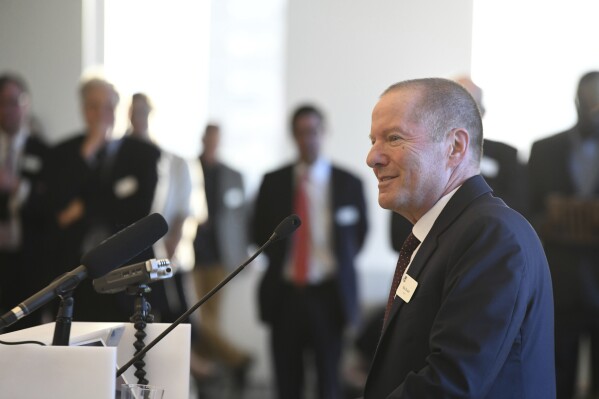Who are the 2023 MacArthur ‘genius grant’ fellows?
The John D. and Catherine T. MacArthur Foundation announced the 2023 class of fellows, often known as recipients of the “genius grant,” on Wednesday.
The 20 fellows will each receive a grant of $800,000 over five years to spend however they want, though they are selected for the exceptional work they’ve already done, their ability to do more and their ability to leverage and be enabled by the fellowship itself, said Marlies Carruth, who directs the MacArthur Fellows program.
The foundation reviews nominations for fellows over a yearslong process that solicits input from their communities and peers. Fellows do not apply and are never officially informed that they’ve been nominated unless they are selected for the award.
The 2023 fellows are:
 Meet this year’s MacArthur ‘genius grant’ recipients, including a hula master and the poet laureate
Meet this year’s MacArthur ‘genius grant’ recipients, including a hula master and the poet laureate
 4 environmental, human rights activists awarded ‘Alternative Nobel’ prizes
4 environmental, human rights activists awarded ‘Alternative Nobel’ prizes
 University of the People founder and Arizona State professor win Yidan Prize for education work
University of the People founder and Arizona State professor win Yidan Prize for education work
E. Tendayi Achiume, 41, Los Angeles, a legal scholar who examines the history of global migration to argue for a reimagining of the rules governing the movement of people.
Andrea Armstrong, 48, New Orleans, a legal scholar who focuses on incarceration and created a methodology for documenting the deaths of people who die in prison or jail.
Rina Foygel Barber, 40, Chicago, a statistician who has developed tools to test the accuracy of predictions made by machine learning on large and complex datasets.
Ian Bassin, 47, Washington, a lawyer and advocate for democracy who helped design changes to federal election laws that Congress eventually passed.
Courtney Bryan, 41, New Orleans, a composer and pianist who draws on jazz, classical and sacred music as well as recordings of contemporary voices to create works in a range of formats that center the experiences of African Americans.
Jason D. Buenrostro, 35, Cambridge, Massachusetts, a cellular and molecular biologist who developed new methods and tools to better understand how and when genes are expressed.
María Magdalena Campos-Pons, 64, Nashville, Tennessee, a multidisciplinary artist originally from Cuba who works across mediums exploring motherhood, migration, memory and the slave trade as well as teaching and supporting the work of other artists.
Raven Chacon, 45, Red Hook, New York, a composer and artist whose performances and visual art question and reveal the histories and legacies of European colonization of the United States.
Diana Greene Foster, 52, San Francisco, a demographer and reproductive health researcher who has helped build a body of research about the impact that having or being denied access to contraception and abortion care has on the lives of women.
Lucy Hutyra, 47, Boston, an environmental ecologist whose research into how, when and why carbon moves through urban landscapes has helped cities improve climate mitigation strategies.
Carolyn Lazard, 36, Philadelphia, an artist whose videos, installations and performances explore disability, health and medicine including through the use of accessibility practices.
Ada Limón, 47, Lexington, Kentucky, a poet whose work often draws from the wonder of the natural world and who has worked to bring poetry to new audiences.
Lester Mackey, 38, Cambridge, Massachusetts, a computer scientist and statistician whose research has helped improve the efficiency and predictions of machine learning techniques.
Patrick Makuakāne, 62, San Francisco, a master teacher of hula and cultural preservationist whose choreography and dance have blended hula with contemporary influences while uplifting Hawaiian languages and histories.
Linsey Marr, 48, Blacksburg, Virginia, an environmental engineer who studies air quality and how viruses are transmitted through the air to inform and improve public health guidance.
Manuel Muñoz, 51, Tucson, Arizona, a fiction writer whose stories are rooted in the multifaceted experiences of the Mexican American community in California’s Central Valley.
Imani Perry, 51, Cambridge, Massachusetts, an interdisciplinary scholar and writer who has authored multiple books about the resistance and activism of Black Americans in the face of injustice.
Dyani White Hawk, 46, Shakopee, Minneapolis, a multidisciplinary artist whose paintings, embroidered canvases, photographs and videos uplift and draw connections between Indigenous art practices and aesthetics and contemporary and modern art.
A. Park Williams, 42, Los Angeles, a hydroclimatologist whose research has uncovered new insights into the impact of climate change on wildfires, drought and forest growth.
Amber Wutich, 45, Tempe, Arizona, an anthropologist who has contributed to building a body of research to understand the impact of water scarcity on communities and how those communities cope or respond.
___
Associated Press coverage of philanthropy and non-profits receives support through the AP’s collaboration with The Conversation US, with funding from Lilly Endowment Inc. The AP is solely responsible for this content. For all of AP’s philanthropy coverage, visit https://apnews.com/hub/philanthropy.
Disclaimer: The copyright of this article belongs to the original author. Reposting this article is solely for the purpose of information dissemination and does not constitute any investment advice. If there is any infringement, please contact us immediately. We will make corrections or deletions as necessary. Thank you.





